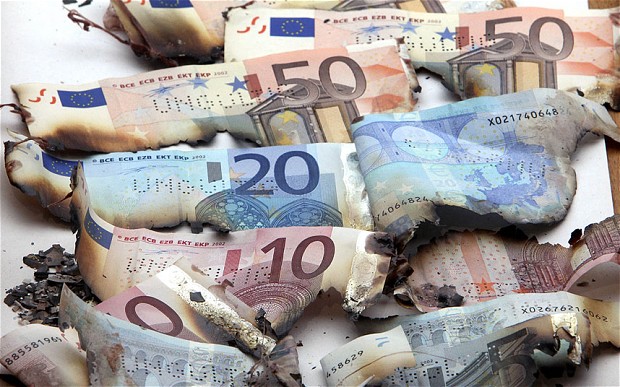 随着欧洲政客们加入了全球政客们用推动货币贬值来争夺市场份额,全世界已经处在全新货币战争的边缘。
随着欧洲政客们加入了全球政客们用推动货币贬值来争夺市场份额,全世界已经处在全新货币战争的边缘。
欧元集团主席容克表示,欧元不再愿意成为持有有毒包裹似的高价值汇率,他描述说,欧元三个月来兑美元、人民币和日元是“危险的过高”。
这个月,两位法国部长警告说,欧元走强阻碍了法国工业从深度衰退走出来。
阿列克谢-乌尤卡耶夫说,随着主要经济体国家努力试图压低汇率的同时,这样的货币政策标着着一个新的升级,目前我们正处在非常严重货币战争的门槛。
韩国已经要求G20国集团采取立场是反对“以邻为壑”的政策,下个月在莫斯科,职责日本和西方国家通过宽松货币政策使得货币贬值。
日本首相安培晋三说,除非同意启动一个货币闪电战来削弱日元,否则要踢脱由于改变日本银行法令威胁的冲突。自七月以来,欧元已经飙升了20%。摩根士丹利的汉斯·雷德克表示,“这会很快伤害到欧元与德国,日本在面临汽车、机床与电子产品出口方面也面临同样的竞争。”
他警告称,欧洲银行仍然在撤回基金,他们削减了外国资产以适应更加严苛的资本规则,推高了欧元。全球中央银行,特别是亚洲,去年在买家们罢工后也纷纷回到了欧洲债券市场。
雷德克预计,2014年在欧元冲到崩溃的1.08美元兑换率后,欧元在今年早些时候仍然会走高。这的确是一个双刃剑效应,尽管可以有助于债券收益率,但是也限制了各自对欧元的兑换率。
来自巴克莱银行的朱利安说,2012年第三季度欧元贸易比重上涨了6%。如果持续下去,今年欧元区GDP将减少0.4%而同时经济已经萎缩了。在西班牙的失业率已经达到了创纪律的11.8%的增长。
到目前为止欧洲央行拒绝采取行动来遏制欧元走强,而隔岸观火的日本、 美国、英国、瑞士、挪威、新西兰和韩国和其它国家在努力使得他们货币贬值。
周三,奥地利央行行长诺沃特尼说,欧元走强不是主要关心的问题。欧洲央行行长马里奥·德拉吉对于上周担忧置之不理,坚持说,“真正有效欧元汇率是保持长期平均。”
历史上汇率可能意味着数年后欧元区内部不再有分歧。一项由摩根士丹利的研究表明,“公平”汇率大概是,欧元兑德国马克1.53美元、兑荷兰1.23美元、兑意大利是1.19美元、兑希腊是1.06美元。
《里斯本条约》赋予了欧盟财长重要的汇率发言权。欧盟委员会可以通过一致投票来解决欧元汇率,并形成一个合理的多票数通过的汇率,任何这样由理事会的规定也迫使欧洲央行改变政策。
随着衰退加深,采取行动的压力也越来越大。一连串国家在最近几天下调了预期。葡萄牙央行预计今年萎缩1.9。荷兰国内生产总值将下降0.5%,预计德国从1%下降到0.4%。
在欧盟事务中,对于建立联盟,法国是一个关键国家。而这个国家自从加入欧元区以来已经惊人地失去了全球出口份额,工业每年裁员10万人。这样最终会引起贸易主义反弹。工业部长阿尔诺·梦特布尔上周表示,多边贸易协定“死了”,并抨击了中国的掠夺实践行为。
前英国利率的制定者也是现在华盛顿彼得森研究机构的普森说,随着今年“坝堤崩溃”及每个国家诉诸于这样的“大溃败”政策,今年可能会出现一个链锁反应。
根本问题是全球储蓄供过于求,世界上储蓄率占GDP的比率达新高24%,主要受到亚洲和老年化影响。贸易专家说,除非削弱全球制造业的产能过剩,否则国际体系不可能回到健康平衡水平。
Jean-Claude Juncker, EuroGroup chief, has signalled that Europe is no longer willing to be the last economic player holding the toxic parcel of an over-valued exchange rate, describing the euro as “dangerously high” after its three-month surge against the dollar, yuan and yen.
The comments follow warnings by two French ministers this month that the strong euro is holding back efforts to pull the France out of deep industrial slump.
Alexei Ulyukayev, deputy head of Russia’s central bank, said the tilt in EMU policy marks a new escalation as every major bloc of the global economy tries to drive down its exchange rate at the same time. “We are now on the threshold of very serious currency wars,” he said.
Korea has asked the G20 take a stand against beggar-thy-neighbour policies in Moscow next month, accusing Japan and the West of covert debasement through loose money.
Japan’s premier Shinzo Abe kicked off the latest skirmishes by threatening to change the Bank of Japan’s statute unless it agrees to launch a monetary blitz and weaken the yen. The euro has rocketed by 20pc against the yen since July. “This will soon start to hurt core Euroland and Germany. The Japanese compete in the same export niche of cars, machine tools and electronics,” said Hans Redeker from Morgan Stanley.
He warned that European banks are still repatriating funds as they cut foreign assets to meet tougher capital rules, pushing the euro higher. Global central banks - especially in Asia - are also stepping back into the EMU debt market after a buyers strike last year.
This is a double-edged effect. While they help cap bond yields, they are also capping their own currencies against the euro. Mr Redeker expects the euro to punch yet higher early this year before buckling and crashing to $1.08 by 2014.
Julian Callow from Barclays said the trade-weighted euro has risen 6pc since the third quarter of 2012. If sustained, this will lop around 0.4pc off eurozone GDP this year at a time when the economy is already contracting. The jobless rate has reached a record 11.8pc, rising to 26.6pc in Spain.
The ECB has so far refused to take action to curb euro strength, standing aloof as Japan, the US, Britain, Switzerland, Norway, New Zealand and Korea itself, among others, try to steer their currencies lower.
Austria’s ECB governor Ewald Nowotny said on Wednesday that euro strength is “not a matter of major concern”. The ECB’s president Mario Draghi brushed aside concerns last week, insisting that “both the real and the effective exchange rate of the euro are at their long-term average”.
The historical rate may mean little after years of intra-EMU divergence. A study by Morgan Stanley found that the “fair” rate for the euro is $1.53 for Germany, $1.23 for Holland, $1.19 for Italy and $1.06 for Greece.
The Lisbon Treaty gives EU finance ministers the crucial say over the exchange rate. The "Ecofin" council can fix the euro against other currencies by unanimous vote, and can shape a "dirty float" by a qualified majority vote. Any such ruling by the council would compel the ECB to shift policy.
Pressure for action is mounting as the slump deepens. A string of countries have downgraded their forecasts over recent days. Portugal’s central bank expects contraction of 1.9pc this year. The Netherlands said Dutch GDP will fall 0.5pc. Germany slashed its forecast from 1pc to 0.4pc.
As often in EU affairs, France is the pivotal state, with the heft to build a coalition. The country has been been losing global export share at an alarming since EMU began, shedding 100,000 industrial jobs a year. This has finally set off a protectionist backlash. Industry minister Arnaud Montebourg said last week that multilateral trade deals are “dead” and slammed predatory practices by China.
Adam Posen, a former UK rate-setter and now at Washinton’s Peterson Insititute, said there could be a chain-reaction this year as the dam breaks and each country resorts to "sauve qui peut" policies.
The underlying problem is a global saving glut as the world saving rate hits a record 24pc of GDP, chiefly driven by Asia and aging effects. Trade experts say the international system cannot return to healthy balance until excess capacity in global industry is whittled away.
 随着欧洲政客们加入了全球政客们用推动货币贬值来争夺市场份额,全世界已经处在全新货币战争的边缘。
随着欧洲政客们加入了全球政客们用推动货币贬值来争夺市场份额,全世界已经处在全新货币战争的边缘。
